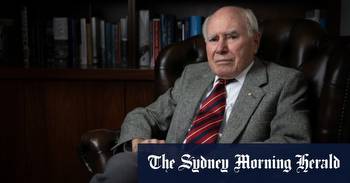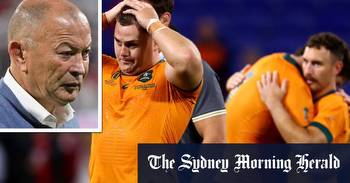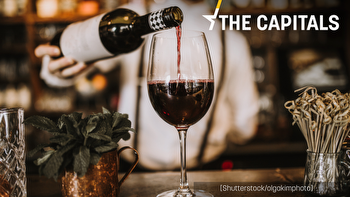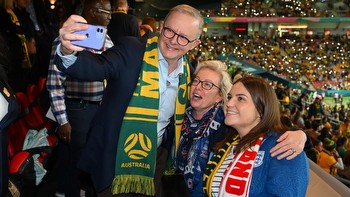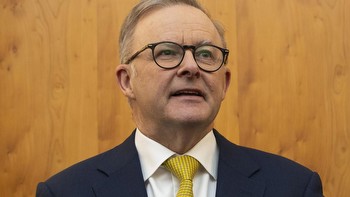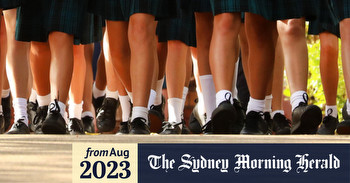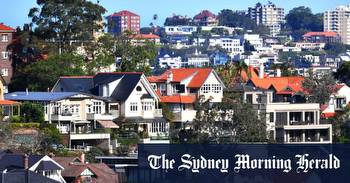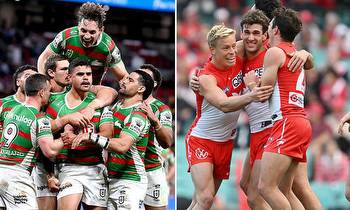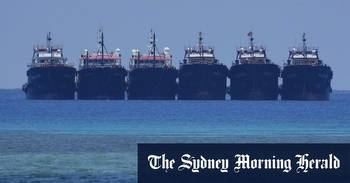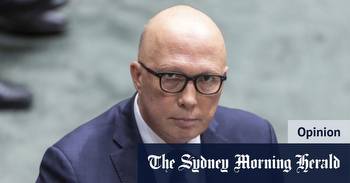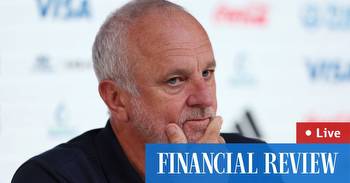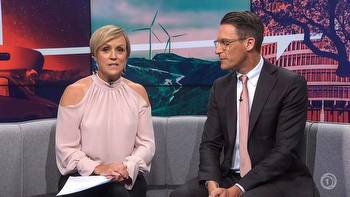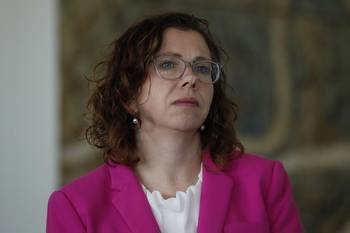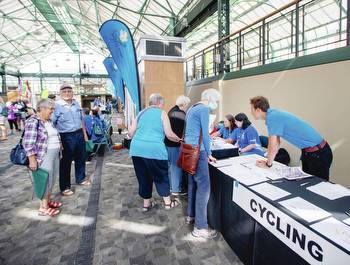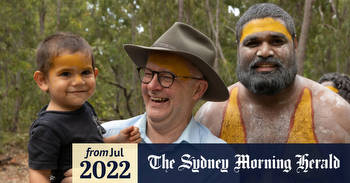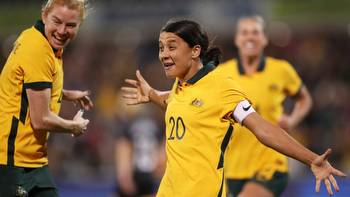The Voice and the opening door

To submit a letter to The Age, email [email protected]. Please include your home address and telephone number. No attachments, please include your letter in the body of the email. See here for our rules and tips on getting your letter published.
As well as the common sense of engaging Indigenous people in policies that affect them, the Voice is an opportunity to recognise the long history of Australia – an ancient culture that makes Australia unique in the world. This is the story of Australia that I never learned and that too many of us are only now understanding, especially my cohort, white men with Anglo ancestry born in the middle of last century. A door is open to embrace a completely different meaning of ″Australia″ – and we should grab this opportunity with both hands. We have nothing to lose by voting Yes, and so much to gain; the story of a unique, richer and ancient Australia.
Steve Wilkins, Fitzroy North
Righting the imbalance of what’s fair
I concur with your correspondent (Letters, 16/8) and would urge politicians and voters alike to decide on lines of fairness only. Since white settlers arrived, black people have been treated with gross unfairness as your correspondent describes. Can anyone, in all fairness, continue to deny First Nations this Voice? How can anyone justify voting No?
Elaine O’Shannessy, Buxton
The contradictory No stance
If you follow the Voice referendum discussions (especially on social media) it is becoming increasingly clear that the No voters have two contradictory reasons for their negativity.
Conservative No says the Voice gives far too much power to First Nations people who are never satisfied and already have adequate representation in the Australian parliament, while progressive No complains that the Voice is an empty meaningless gesture that confers no power at all and upholds the current racist status quo.
Both these arguments cannot be right but the fear and confusion they create have muddied the waters to make it increasingly likely that Peter Dutton and Pauline Hanson will be triumphant on polling day and Australia’s racists will be entitled to claim a righteous democratic majority. Not all No voters are racist, of course, but social media shows us clearly that all racists are voting No.
Brian Derum, North Fitzroy
Where is the place for Treaty?
Your correspondent (Letters, 7/8) says that ″if Albanese were to split the [referendum] question and deal with the mechanics of the Voice by legislation, he would be on the side of a clear majority and our country would be all the better for it″. Yes, but he will not because he is evidently ideologically rather than practically driven, and then only reservedly so – where in his put question is the Treaty?
Peter Drum, Coburg
Can clarification be given on reparations?
In discussions regarding the Voice referendum, Prime Minister Anthony Albanese is reported as rejecting paying reparations or compensation to Indigenous Australians. He cites the Uluru Statement from the Heart, which he says does not call for reparations or compensation. The PM’s comment seems to be at odds with some statements made by Yes campaign leaders. I hope that all of the major Indigenous leaders supporting the Yes campaign can clarify whether they agree with the PM that reparations and compensation will not follow if the the Voice referendum is successful.
Adrian Hassett, Vermont
A point beyond laughter
A friend recently remarked that if the Voice referendum failed, Australia would be the laughing stock of the world. The world will not laugh. It is already shaking its collective head in disbelief that anyone would even consider opposing a Voice as the first step to partnership, participation and protection.
Sandra Kay Patton, Talbot
FORUM
Equality, please
If you asked people to name a 2022 Socceroo player, they might remember the Grey Wiggle. Many Australians could name lots of the Matildas. All, however, should be shocked at the disparity of earnings between male and female World Cup players. Winning the women’s World Cup earns you $6 million. The Socceroos made the final 16 in Qatar and received $20 million. The world game needs to lift its game on equality.
Greg Tuck, Warragul
Rename the day
The public holiday on the day before the AFL men’s grand final is pointless. One way out of the public holiday question might be to keep the holiday but use it to acknowledge all of our significant, post-war, female sporting achievers: The Matildas, Cathy Freeman, Ash Barty, Margaret Court, Evonne Goolagong Cawley, Shane Gould, Dawn Fraser, Raelene Boyle, Betty Cuthbert, Marjorie Jackson, Shirley Strickland and Michelle Payne (there may be more who should be added to this list.)
Renaming this holiday would make it both meaningful and gender inclusive.
David Hickey, Heidelberg
Reasons for Yes
Your correspondent (Letters, 16/8) queries the rights of those multinational companies, and other large organisations, who are suggesting to the public how they should vote in the referendum.
While I hope the directors of these companies believe in their collective hearts that it’s the right thing to do, I suspect they are also aware of the reputational damage to Australia should the referendum fail. Another good reason to vote Yes.
Jo Bond, South Melbourne
Freedom to speak
Your correspondent (16/8) asks what right do Wesfarmers, Woolworths, Qantas and others have to make suggestions on how people should vote in the referendum.
The same right that the rest of us, including vocal politicians, have – it is called freedom of speech.
Brian Kidd, Mt Waverley
Company lines
Elizabeth Knight (, 16/8) discusses the different views regarding companies taking a stand on social issues. In addition to the strong case for social, environmental and governance issues to be at the front of mind
for companies, there is the political aspect.
At present, political parties are structured as companies and spend much of their time taking a stand on social issues. Some advocates for the No campaign against the Voice to parliament are structured as a company.
Pertinent questions are: whether a company structure is the appropriate model for political parties, and should there be a requirement for truth in social pronouncements from these political companies?
Bruce McGregor,
Brunswick
Tame economics
Ross Gittins’ plea (“Find a fairer way to fix inflation”, 16/8) highlights the inadequacy of federal government economic policy to address rising inflation. This is not a criticism of Treasurer Jim Chalmers. Today, the increasing interest rates are creating more economic hardship to the 30 per cent of Australians with mortgages, many trying to feed, clothe and educate children.
The International Monetary Fund recommends governments introduce “fiscal tightening (which) cools demand without the need for interest rates to rise”. Perhaps the lack of “well-targeted monetary policy” is too much of a political risk? By inflicting pain on a minority of mortgagors, the angst creates less backlash at the ballot box.
Pardon my cynicism: it’s been well cultivated over many, many election cycles.
Sally Davis, Malvern East
Dutton’s N-test
Your correspondent (Letters, 16/8) suggests testing Peter Dutton’s enthusiasm by building a nuclear power plant in his electorate of Dickson.
An even more telling test of his desire to go nuclear would be to ask him if he will bury the nuclear waste there.
Margaret Callinan, Hawthorn
A public service?
Now that the brouhaha about PwC and KPMG has died down a bit, would it not be worth pondering on why governments at state and federal levels, who employ huge numbers of public servants at enormous expense to the taxpayer, need to consult outside organisations at all. If the public servants are doing their job, surely external consultants should be totally unnecessary.
If they are not doing their job, then the answer is obvious.
Peter Valder, Toorak
Widen the goals
Your correspondent (Letters, 14/8) is right. Soccer’s scoring system is useless. Games ending with a score of 1–0 or 0-0 are quite common. Does that really reflect the relative performance of the two teams?
Any single goal can be due to luck. But if the score is 16 goals to nine goals (like in Australian rules), you can be fairly sure the winning team did play that much better. The soccer goal should be made twice as wide.
Geoff Dalton, East Malvern
Mental health crisis
The article, ″On a mission for better mental health″ (13/8), on Assistant Mental Health Minister Emma McBride astutely noted that the latest suicide data showed numbers had spiked last year, after Australians experienced waves of crises. It also rightly pointed out that cuts to Medicare-subsidised psychology sessions have left those with complex mental illnesses lacking support.
It has been eight months since those session cuts were made, and psychologists are now witnessing the devastating human fallout: Clients who have to stretch their sessions to just one a month; those who cannot afford a regular session because the rebate is not high enough; those who need immediate help only to find there is a four-month waiting list.
And in the seven months since the federal government hosted a round-table forum for peak mental health bodies with the promise of tackling this enduring mental health crisis, we have received no tangible solutions on a way forward to make mental healthcare truly accessible and affordable for everyone.
It is time for serious investment into the future mental wellbeing of this country.
Carly Dober, Director,
Australian Association of Psychologists
The bigger picture
Those farmers protesting at being forced to host environmentally vital power lines through their properties (16/8), for which they are going to be compensated for, should take heed from the experience of my parents. Their dairy farm was commandeered by the SEC in 1949. It was subsequently dug up for the coal underneath to supply the Morwell power station. The compensation they received was far less than market value but they recovered from this body blow and eventually moved to Colac in Victoria’s Western District to continue dairying until their retirement.
They have long since passed away, but my parents’ resilience and penchant for hard work has been, and continues to be, an inspiration for our family. Perhaps one day, the families of the aforementioned protesting farmers will be proud that renewable energy is being transported via power lines on properties still in their hands.
Phil Alexander, Eltham
Playing a part
If the farmers demonstrating in Spring Street about transmission lines want to see how they affect farming, they just have to look to the high-voltage lines connecting the Latrobe Valley to Melbourne for the past 90 or so years. Dairy and beef cattle and sheep happily grazing underneath as well as orchards and vegetable farming. And no whingeing about being a conduit to supply electricity to the state. Climate change is far more difficult for farmers than the aesthetics of power lines, especially when they will get financially compensated.
Everyone has to play their part in the fight and these farmers have to realise that they could be arbiters of their own demise if they prevent renewable energy entering the grid.
Dan Caffrey, Traralgon
Thank you, Jack
As a devout AFL and Collingwood supporter, I have always applauded and appreciated great talent and humility in our sport. Hearing of Richmond player Jack Riewoldt’s impending retirement, may I join in the chorus, and sing well done, Jack, well played sir.
Darren Grindrod, Glenroy
Learn from the past
On August 6 and 9 in 1945, Hiroshima and Nagasaki were destroyed by nuclear weapons dropped by the United States.
Australians are no stranger to the destructive power of nuclear weapons and radioactive fallout. Between 1952 and 1963, the UK conducted seven nuclear weapon tests in Maralinga in South Australia with other smaller-scale tests in central Australia and the Montebello Islands off Western Australia.
The McClelland royal commission in 1984-85 declared these test sites to be significant radiation hotspots. Nuclear radiation lasts for hundreds of thousands of years. Toxic radiation from these tests has never been resolved. Nor has the implications of protecting humans and our environment from radiation from uranium mining, nuclear power generation and spent fuel storage. Yet Australia is plunging, unquestioning, into nuclear-powered submarines, and potentially much more.
Rosemary Cousin, Allambee South
It’s a doggone problem
I have noticed over the past year or so quite a few dogs in food shops and cafes in Melbourne. I even saw one woman taking her dog on a leash into a supermarket, and it wasn’t a guide dog. Much as some of us would love our laws to allow this, as they mostly do in the UK and Europe, it is still against the law in Australia. So it’s either stupidity or arrogance.
John Cross, Richmond
AND ANOTHER THING
The Matildas
If we have a public holiday to celebrate the birthday of King Charles, surely we can have a public holiday to celebrate as a nation the amazing efforts of the Matildas – whether they win, lose or draw.
Randall Bradshaw, Fitzroy
I agree with David Littleproud: public holidays should be reserved for important national events, such as the birthday of the British monarch.
Greg Pyers, Daylesford
Imagine the poor primary school teacher in 2028: half the class named Matilda.
Pam Cupper, Dimboola
The best way to truly support and grow women’s sport is for media, business and the public to pay attention when a team is not winning.
Julie Perry, Highton
Furthermore
Brilliant Golding (16/8). One cartoon crystallises the absurdity of the No campaign.
Joan Segrave, Healesville
To propose nuclear energy after a decade of climate inaction sounds like a lamb bleating in a bushfire.
Greg Curtin, Blackburn South
Your correspondent’s ″simple request″ in relation to the Voice (Letters, 16/8) sums it up perfectly. Russell Brims, Bentleigh East
Ban rent rises? Why not ban food, petrol and energy rises as well? It’s the same logic.
Dianne Lewis, Mt Martha
Why do we need a public service when we have the big four companies giving frank and fearless advice to governments? Oh, for a fee of course.
Peter Randles, Pascoe Vale South
Re graffiti: I liked the rudest word a kid could think of to paint on a fence by the suburban railway line: “Bosom”.
Jacki Burgess, Port Melbourne
Finally
For heaven’s sake, give New South Wales the grand prix. Let them take it off our hands.
Marie Nash, Balwyn


